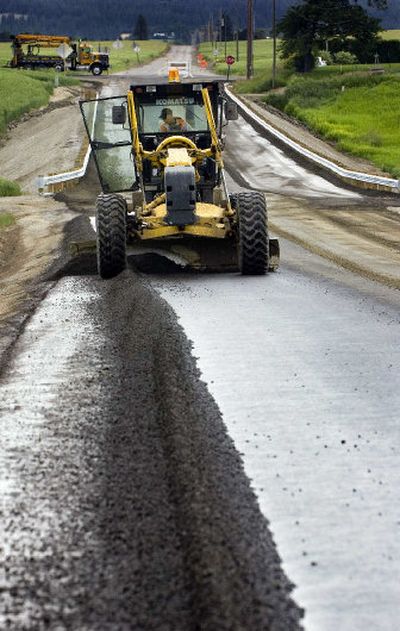Soaring price of asphalt putting projects in peril

Skyrocketing asphalt prices are steamrolling road construction budgets.
The higher-than-anticipated costs are forcing agencies to postpone or scale back some paving projects.
The Idaho Transportation Department pulled the plug last week on a plan to repave Interstate 90 from the Washington state line to just east of Coeur d’Alene this year, postponing it until 2007.
A 21 percent price increase in Spokane County’s Peone Road project pushed it up $155,000 over the original estimate.
And the Hayden City Council voted last week to scratch one-quarter of a one-mile Government Way construction project when increases to asphalt, concrete and manpower prices caused the project to balloon from a projected $2.4 million to $3.2 million, said Hayden City Engineer Jeff Zaugg.
“It’s very shocking, the rate of climb,” said Zaugg
The average asphalt price increased 24 percent in Washington during the first quarter of the year, according to a Washington state Department of Transportation report on construction materials.
The problem isn’t unique to this area. Asphalt prices are up all over the nation.
The cost escalation can be boiled down to one major issue: oil. As oil prices go, so go asphalt prices. And the trend has been up, up, up.
“The products we use are petroleum based, and everyone can see the rising cost of a barrel of oil,” said Washington state Department of Transportation Eastern Region spokesman Al Gilson.
WSDOT delayed a project to resurface Highway 20 at Sherman Pass until the end of the year and into next summer because asphalt prices made it too expensive to complete entirely this year, said Gilson.
One particular problem for the state is its slate of “nickel” gas tax projects. The costs for those projects were estimated three years ago, said Gilson. And despite an attempt to predict costs conservatively by planning for 8 percent inflation, the state instead saw commodity prices rise 40 percent last year.
The Idaho Department of Transportation put a project to repave I-90 from Wolf Lodge Bay over 4th of July Pass out for a second round of bids this year when it came in over the estimate, said ITD spokeswoman Barbara Babic.
Contractors’ bids were even higher the second time.
“We just realized we aren’t going to get any lower than the low bid is,” Babic said.
Spokane’s Street Department spent $450,000 on asphalt for street maintenance this year, the same amount it spent last year, said Scott Egger, the city’s streets director. But this year’s budget bought the department one-quarter less asphalt.
“In terms of capital projects and our bond projects, we got the bids out early, so our prices were fixed earlier in the year,” said Egger.
That means Spokane won’t have to cancel any of those projects this year.
“So far none of our projects have been delayed or deleted or altered in scope, but we continue to feel the pain of the higher asphalt prices,” said Spokane Valley Senior Engineer Steve Worley.
Spokane Valley has been dealing with prices 20-30 percent higher than engineers estimated earlier this year.
Should prices continue to climb in coming years, “We may be looking at scaling down future projects,” Worley said.
Every one of Spokane County’s road projects has come in over budget this year, said County Engineer Ross Kelley.
“We’re eating into some of the money that we’ve put aside for contingencies and other projects,” Kelley said.
And asphalt isn’t the county’s only problem. A cement-treated project on Spangle-Waverly Road was canceled for the second straight year because of cement shortages, Kelley said.
Asphalt prices may level off, but they won’t return to what they used to be, said Inland Asphalt Co.’s estimating manager, Jim Ellingson.”We’re passing along our higher costs,” Ellingson said.
But that doesn’t mean the company is making more money. Margins are lower, and there may be fewer projects in the future, he said.
Local transportation officials said they worry they may have to indefinitely postpone some projects if asphalt prices continue to climb.
“There are finite dollars available, and we have allocated so many dollars per project,” said Babic. “If the estimates keep getting exceeded, it is going to affect a project somewhere.”